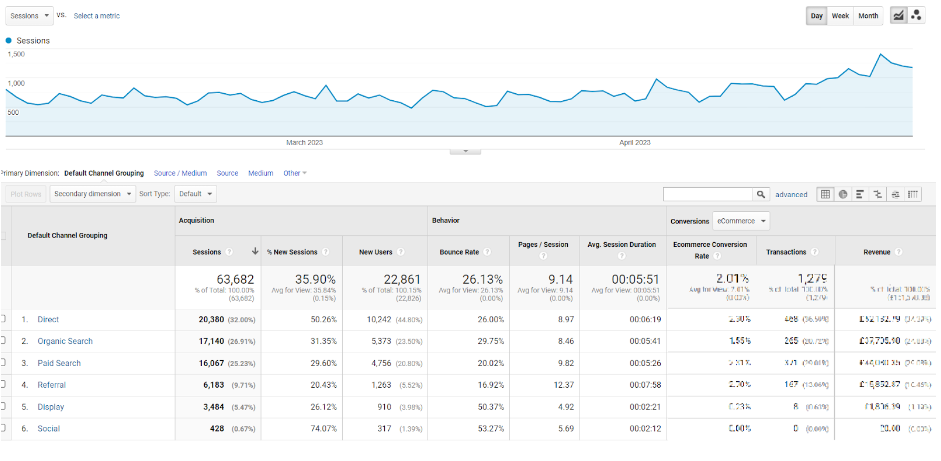5 Small Business SEO Tips For 2023

Brand recognition and visibility are crucial for small businesses, especially in those all-important early days. Simply put: if customers are unaware of you, your company just won’t grow!
Search engine optimisation (SEO) is one of the finest techniques to increase exposure and generate visitors from searches, producing fantastic results with the right time and effort invested.
It’s estimated that more than 65% of shoppers investigate products online before making a purchase – so it is essential to optimise your online presence, regardless of the sector or market you are in.
Stressed about search engines? Don’t panic!
Thankfully, there are some handy tricks that can shorten this sometimes lengthy process.
The Dandy team is also here to help with all things SEO, so we’ve put toether a tip-top list of the best small business SEO tips to start your SEO strategy with a bang!
What is small business SEO?
Small businesses SEO is the practise of improving your website and online visibility to increase traffic from Google and other search engines.
This includes bringing more qualified leads, clients, and customers to your website from search engine results pages. Essentially, SEO helps you climb the ladder of search engine rankings, the aim is to get onto page one of Google results!
Simply put, small business SEO is a subset of general SEO, but with a more narrow focus and with fewer resources.
Additionally, if your small business or local business has a physical location, you should put an emphasis on local SEO or local search results.
Why is SEO important for small businesses?
You’re not the only one who questions whether SEO is worth the effort. In fact, only 36% of small businesses have an SEO strategy in place. However, to develop trust, generate leads, and increase conversion rates for your marketing efforts, search engine optimisation is one tool you need at your disposal.
We don’t need to overstate the obvious here – SEO works, it’s as simple as that!
Still not sure? Take a look at some of our case studies to see how SEO rocketed small businesses up the rankings.
5 SEO tips for small businesses
Diving into the world of SEO can be daunting for small business owners and start-ups, here are a few tips to get SEO into your digital marketing strategy from our marketing experts:
Set up Google Analytics and Google Search Console
The two most important tools for following your SEO efforts and keeping track of your results are Google Analytics and Google Search Console.
In order to determine whether SEO efforts are being successful, you must first establish an initial grasp of your current traffic and engagement metrics.
To know how you’re doing, track your advancement, and identify the improvements that have had a beneficial impact on your business, you’ll also need to keep an eye on this data as time goes on.
Google Analytics is a platform for analytics that offers comprehensive information on traffic, user engagement, conversions, user demographics, and much more.
See below for a recent example:

On-page SEO is a term frequently used to describe this. Your metadata, which includes things like title tags, meta descriptions, and at least one header on each page, is where your keywords should be placed the most.
This is Google’s bread and butter for making your business visible in search rankings and search results.
Analyse your competitors
You can discover new keywords, learn what kinds of material your visitors want to view, and develop a more comprehensive grasp of the online environment for your company by researching your SERP competition.
The websites you’ll be vying with for exposure on the SERPs (search engine results page) are your SERP competitors.
- Take note of the following while researching SERP rivals for your target keywords:
- Do they rank a specific page or just their home page?
- In what way does the page utilise keywords?
- How are their webpages organised? Look at their header navigation menus for a hint.
- What sort of content are they offering?
- Who is their target audience?
Link building
Another SEO tactic that might raise your ranking and increase organic traffic is link building. Creating links to your website from other websites is known as link building.
Search engines are more likely to regard you as a reliable source when credible websites connect to you (perhaps through a guest post on their blog), which might raise the ranking of your web pages.
However, 93.8% of link builders say link quality is more important than link quantity.
Low-quality backlinks originate from websites with little engagement and little traffic. Links from low-traffic websites are often of little or no use to your website because people are unlikely to see them.
Blogging
Blogging helps improve SEO quality and search traffic by establishing your website as an appropriate response to your clients’ inquiries.
SEO-friendly blog posts that make use of a range of on-page SEO techniques can increase your chances of ranking in search results and improve the user experience on your website.
Blogging can also drive organic clicks to your website by assisting you in developing relevant content across a range of different search intents.
There are a variety of reasons why people search online. Blogs have the unique ability to respond to informative, transactional, and navigational search queries, whereas landing pages tend to be more transaction-focused.
For example, someone who may need be looking for a new holiday outfit, may search “summer fashion trends” before deciding what to purchase. If you have a blog on that topic you can get infront of potential customers in the research phase. The same can be said of researching eCommerce purchasing, so you’ll need to produce content to support your products.
More forms of content can result in more clicks on your pages, which will, in turn, boost your SEO even more as you become a trusted informational authority in your industry.
Google Business Profiles
Google is the best search referrer, regardless of whether you’re searching for web or foot traffic.
A Google Business Profile makes it more likely that customers will find your company when looking for similar goods and services in their area.
Searchers can find your business by using the information on your Google Business Profile listing.
Additionally, a Google Business Profile helps your local SEO. In particular, when customers use Google Maps to search for nearby businesses, a listing for a local business is more likely to show up.
Looking for an SEO agency to boost your small business’ presence online?
So there you have it, those were just a few of our top marketing tips for small and local businesses to incorporate SEO in their digital marketing strategy.
But, as you know, SEO as a whole project is huge, so why not let Dandy take the reins?
Get in contact with Dandy right now if you want to increase your search rankings, traffic, and engagement but lack the time or expertise to do it. We are a full-service digital marketing company with over 10 years of expertise offering our clients top-notch SEO management services.
Check out our SEO packages or Book Your Free SEO Audit today!
Small business SEO tips FAQs
Does SEO really work for small businesses?
SEO is crucial since it promotes you as a subject-matter authority, increases website traffic, and aids in the free, natural promotion of your company.
Is SEO still relevant in 2023?
Yes, SEO is still important in 2023 and will continue to be so for some time. That’s because SEO aids search engines in crawling and classifying your website so that it can rank web pages more favourably when users enter search terms. Google and other search engines seek to assist users in finding the answers to their inquiries.

